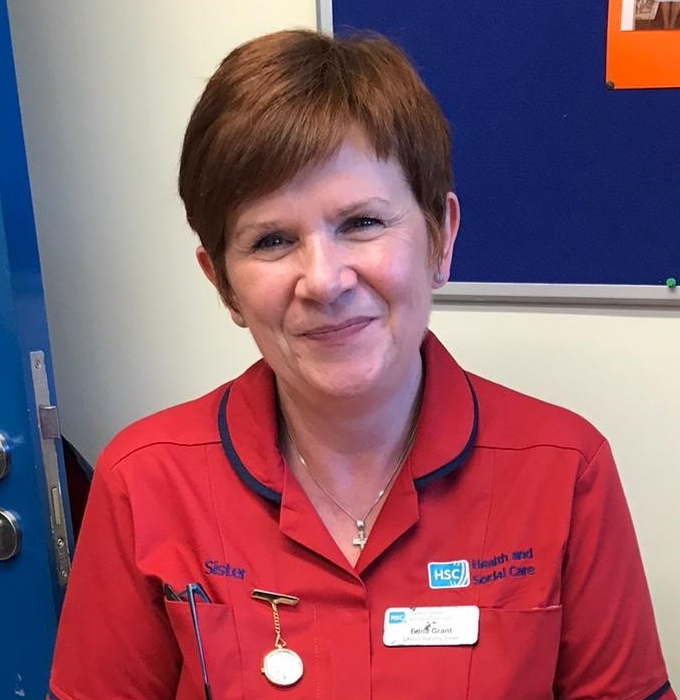One year on from Northern Ireland’s nursing strikes, new RCN board members Conor, Edna and Andrew reflect on what happened and how their involvement inspired them to take on a more active role in the RCN
Historic industrial action in Northern Ireland last year paved the way for pay parity and safe staffing measures, but it also encouraged many members to pursue a more active role in the RCN, including leadership roles on the RCN Northern Ireland Board.
Conor McDowell (pictured above), a clinical nurse specialist in infectious diseases at Belfast Health and Social Care Trust, braced the winter cold when he took to the picket line outside Royal Victoria Hospital alongside his fellow RCN members last December.
One year later and he has been successfully elected onto the RCN Northern Ireland Board for the next four years with his term of office starting on 1 January 2021.
“I’m absolutely delighted,” says Conor. “It was as a result of the strikes, that’s what made me become a bit more involved.
“Certainly, for the first time in my career, I felt nursing had comradery – a feeling of togetherness – so it definitely gave me fire in my belly to apply for the board.”
Pushed to the limit
At the time of the industrial action, nursing pay in Northern Ireland had fallen behind the rest of the UK, with newly qualified NHS nurses earning £22,795 per annum, while colleagues in England and Wales were starting on £24,214.
Chronic short staffing had left patients being treated in hospital corridors and nurses struggling with excessive caseloads, as well as creating risks to patient care.
RCN and other union members successfully undertook three days of strike action on 18 December 2019, and 8 and 10 January 2020.
As a result, the government agreed to restore pay parity with nurses in England and implement a series of measures to improve safe staffing.
“We advocate for patients first and foremost,” says Conor. “If we don’t have the staff and the resources to look after people going forward, then we don’t have a workforce, we don’t have nurses, and we need to be able to attract a diverse range of people into nursing.”
While Conor knows that the outcome of the strike action was a victory, there is a lot more to be done regarding safe staffing and improving patient care.
He says: “It’s about knowing there’s the right amount of people with the right skills to care for the patient when they’re in hospital, so I think we’ve more work to do on that. That’s certainly something I hope to contribute to with my position on the board going forward.”
Certainly, for the first time in my career, I felt nursing had comradery – a feeling of togetherness
Pictured above: Conor (far left) with RCN Northern Ireland Director Pat Cullen (second right) and others on the picket line
Having positive role models lead the way last year was a great motivator, and Conor affectionately describes Pat Cullen, RCN Northern Ireland Director, as a mentor.
“I think Pat was outstanding in her leadership, in how she held herself, but also how she advocated for me as a nurse and more importantly for patients,” Conor adds.
“I think that took bravery. It was courageous and I think I learned a lot from her leadership. She’s the epitome of a leader to me because she’s kind, she’s caring, she’s compassionate, but she holds people to account and she’s fearless.”
I’m very passionate about nursing but I think unfortunately nurses often struggle to speak up
Conor has been a member since 2007, when he was a student nurse. While he has attended Congress and contributed to the Belfast branch, this will be his first formal role in the RCN.
He has several goals for his new position, which include ensuring that the RCN continues to be an organisation led by its membership, advocating for members’ needs and making sure the voice of nursing staff is heard.
“I’m very passionate about nursing but I think unfortunately nurses often struggle to speak up, and it’s difficult to speak up. But I certainly think that I’m able to advocate for people in the membership, and I’m looking forward to doing it,” he says.
Nursing perspectives
Another new board member is Edna Grant, a district nursing sister at Southern Health and Social Care Trust with 33 years’ experience.
“I’m a lifelong member since I started nursing back in 1987,” she says. “I think I joined nursing on the one day and the RCN on the next.”
Edna took part in last year’s industrial action too, saying she felt both “terrified” but at the same time “proud to be a part of it”.
She says: “While we understood the need and the drive for change, we never really anticipated, I suppose throughout our whole careers, that we would ever have to go to those lengths in order to be heard.
“But the timing was right. We were extremely frustrated, we were tired, and we did truly believe that there was no alternative.”

Edna emphasises the importance of having a strong network within the union, and says: “When it came to the day before the strike, I think that was when it really did hit home that there would be one derogated nurse covering a caseload for urgent calls only and everything else would have to be delayed.
“Because I had those direct contacts [within the RCN], we were able to do everything safely. We were supported in what we did, and the networking was absolutely amazing.”
This collaborative approach continues to inspire Edna, especially when it comes to better utilising community nursing teams.
Her goal is to bring the voice of district nursing to the table, and encourage nursing staff from across all sectors to share their knowledge, learn from each other and network.
She adds: “I don’t think we’d have coped as well through the pandemic if we hadn’t had the strike. I think it rejuvenated us; it absolutely gave us a voice.”
The most difficult thing any nurse will ever do is not go to work
Representing members
Andrew Hamill, a site manager at Southern Health and Social Care Trust, has also been elected to the Northern Ireland board for a four-year term.
He completed his training as a rep just before the strikes last year and he says being on his trust’s strike committee opened his eyes “to the power of a union.”
Andrew worked in theatres and outpatient wards for several years, which he thinks sheltered him from the bigger picture.
He says: “I took a job as site manager at one of the local hospitals, and I just couldn’t believe how much everything had changed in the ten years from when I was a student.
“I was seeing the wards, I was seeing staff nurses in tears, I was just seeing the chaos in the emergency department and I thought this isn’t right.”
He says that strike action was “the last resort” and that “the most difficult thing any nurse will ever do is to not go to work”, but unfortunately nurses in Northern Ireland had no other option.

Andrew led the picket lines for his trust and says the strikes “put a fire under people”. He adds that he wants to be able to sit on the board, promoting and pushing the RCN’s targets, and remain a strong presence for members by continuing to work on the wards.
He was thrilled to have met RCN Chief Executive & General Secretary Dame Donna Kinnair, when she visited picket lines last year and notes the importance of having visible leaders.
“I want to push the RCN to be more visible. I want to push the RCN to be there to support its members, to really make it known that we are a nursing family and we’re here as a union to support our members, to develop our members, and to improve the services that we are providing,” he says.
“I think the RCN has shown its teeth with the strike action. I think for a hundred years some deemed the RCN to just be there to support management and now we’re making it clear we are here to support members.”
Conor, Edna and Andrew will take up their seats on the RCN Northern Ireland Board on 1 January 2020.
Words by Becky Gilroy. Picture of Conor by Aaron McCracken








